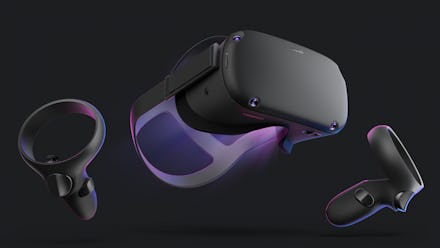Which VR headset is right for you?

Virtual reality is one of the most exciting aspects of the gaming industry right now, mostly due to the many fantastic games being released. The new Half-Life: Alyx is exemplary, and a great representation of what the medium is capable of. But with such a wide variety of headsets on the market, each with different technical requirements, which is the most useful and appropriate to run the games you're interested in playing?
Worry not. This guide will help you figure out which VR setup you and your living space are best suited for. So the next time you get a craving for immersive, high-octane adventuring in another world, you'll know exactly which headset is up to the task.
Oculus Quest
If you want to try out Half-Life: Alyx but don't have the budget for a massive PC or the room to support more powerful headsets, this is by far the best option — so long as you're not too concerned with resolution. The Oculus Quest is a standalone headset that allows for full room-scale movement, without the need for any kind of peripheral work. You can strap on the headset, then look around and move without worrying about any sort of tethering to sensors, or cameras taking you out of the action. It includes two controllers, and features a powerful Snapdragon 835 chipset to ensure it can stand on its own without requiring a more formidable computer as the backbone supporting the setup. While it won't compete with actual hardware, such as what the Oculus Rift S relies on, it can more than handle even graphically intensive games.
Best for: Players who don't need the biggest or the baddest VR setup to play the newest games
Oculus Rift S
The Oculus Rift S is a vastly refined version of 2016's Rift headset, and it's a more powerful option than the Quest alone. It includes a higher-resolution display with self-contained room tracking like the Quest and doffs the cameras and sensors it needed originally. It's cheaper than the HTC Vive at this time, and it's simple to set up, especially if you need tech that you plan on tethering to your PC for a bigger performance boost. You don't need any extra equipment for the Rift S to shine, and it's capable of bringing any high-intensity game to life.
Best for: All-around VR experience with premium quality and all the bells and whistles you'd get with a PC headset
HTC Vive
If you've got the extra cash or desire to build a PC with the latest and greatest hardware on the market, then the HTC Vive is the headset with the most oomph – and the bang for your buck. It's been out on the market for four years, and during that time it's remained the gold standard when it comes to powerful full-motion room tracking. It does require extensive setup and plenty of space in your living area to run properly, but once it's up and going, you've got a premium VR experience that will truly make you believe you're front and center in an alien invasion or your favorite rhythm game. You're just going to need to make sure you have plenty of space for activities, as the saying goes.
Best for: Players who don't mind spending a little more cash for a premium experience
Valve Index
The Valve Index is the newcomer on the block, with intriguing motion controllers that cover the knuckles and track all five fingers in the virtual space. This gives it a much more powerful edge over the other VR headsets available, given that there's more control in virtual reality, but few games are utilizing this technology just yet. Plus, it's also the most expensive headset for PC users at the moment, as well as trickier to set up. It requires special in-room sensors that need to be placed strategically to track movements, and isn't wireless. The trade-off is its improved finger tracking and sharp field-of-view display. It is, invariably, the Cadillac of virtual reality headsets (especially if you're playing a Valve game), but it isn't necessary unless you don't mind the caveats it comes with.
Best for: Anything you can throw at it, with sharper graphics to boot